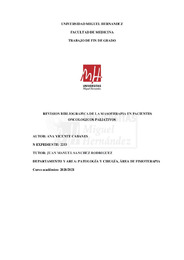Please use this identifier to cite or link to this item:
https://hdl.handle.net/11000/25605Full metadata record
| DC Field | Value | Language |
|---|---|---|
| dc.contributor.advisor | Sánchez Rodríguez, Juan Manuel | - |
| dc.contributor.author | Vicente Cabanes, Ana | - |
| dc.contributor.other | Departamentos de la UMH::Patología y Cirugía | es_ES |
| dc.date.accessioned | 2022-01-07T09:44:49Z | - |
| dc.date.available | 2022-01-07T09:44:49Z | - |
| dc.date.created | 2021-06-21 | - |
| dc.date.issued | 2021-06-21 | - |
| dc.identifier.uri | http://hdl.handle.net/11000/25605 | - |
| dc.description.abstract | Introducción: El cáncer es una de las patologías más presentes en la actualidad. Los cuidados paliativos buscan aumentar el bienestar de los pacientes donde se ha de reducir el dolor y aumentar la calidad de vida. La masoterapia es un tratamiento no invasivo, usado con mucha frecuencia en este tipo de pacientes pudiendo obtener beneficios de este, reduciendo la sintomatología derivada de la patología. Objetivos: Conocer los posibles efectos que posee la masoterapia en pacientes oncológicos paliativos; sus indicaciones y contraindicaciones. Material y métodos: Se realizo una búsqueda en las bases de datos de Pubmed, Web of Science, Scopus, PeDro y Cochraine. De los 492 artículos pasando por filtros de los artículos realizados del 2016 hasta 2021, en humanos y posteriormente excluyendo revisiones bibliográficas y duplicados se acabaron seleccionaron 10 para este estudio. Resultados: La utilización de la masoterapia ha mostrado ser efectiva en la reducción del dolor y psicológico, aunque no hay cambios significativos en otros campos Conclusión: La masoterapia ha mostrado ser efectiva en la reducción de síntomas como el dolor, siendo la principal indicación. En otros campos aunque hay mejora no está suficientemente respaldada por la evidencia. No se han encontrado efectos secundarios ni contraindicaciones | es_ES |
| dc.description.abstract | Introduction: Cancer is one of the most common pathologies nowadays. Palliative care seeks to increase the well-being of patients where pain must be reduced and quality of life increased. Massage therapy is a non-invasive treatment, used very frequently in this type of patient, being able to obtain benefits from it, reducing the symptoms derived from the pathology. Objectives: To know the possible effects of massage therapy in palliative cancer patients; its indications and contraindications Material and methods: A search was carried out in the databases of Pubmed, Web of Science, Scopus, PeDro and Cochraine. Of the 492 articles going through filters of the articles made from 2016 to 2021, in humans and later excluding bibliographic reviews and duplicates, 10 were finally selected for this study. Results: The use of massage therapy has shown to be effective in reducing pain and psychological, although there are no significant changes in other fields Conclusion: Massage therapy has been shown to be effective in reducing symptoms such as pain, being the main indication. In other fields, although there is improvement, it is not sufficiently supported by the evidence. No side effects or contraindications have been found | es_ES |
| dc.format | application/pdf | es_ES |
| dc.format.extent | 31 | es_ES |
| dc.language.iso | spa | es_ES |
| dc.publisher | Universidad Miguel Hernández de Elche | es_ES |
| dc.rights | info:eu-repo/semantics/openAccess | es_ES |
| dc.rights.uri | http://creativecommons.org/licenses/by-nc-nd/4.0/ | * |
| dc.subject | Palliative | es_ES |
| dc.subject | Massage | es_ES |
| dc.subject | Cancer | es_ES |
| dc.subject.other | CDU::6 - Ciencias aplicadas | es_ES |
| dc.title | Revisión bibliográfica de la masoterapia en pacientes oncológicos paliativos | es_ES |
| dc.type | info:eu-repo/semantics/bachelorThesis | es_ES |

View/Open:
TFG.pdf
796,01 kB
Adobe PDF
Share:
.png)
